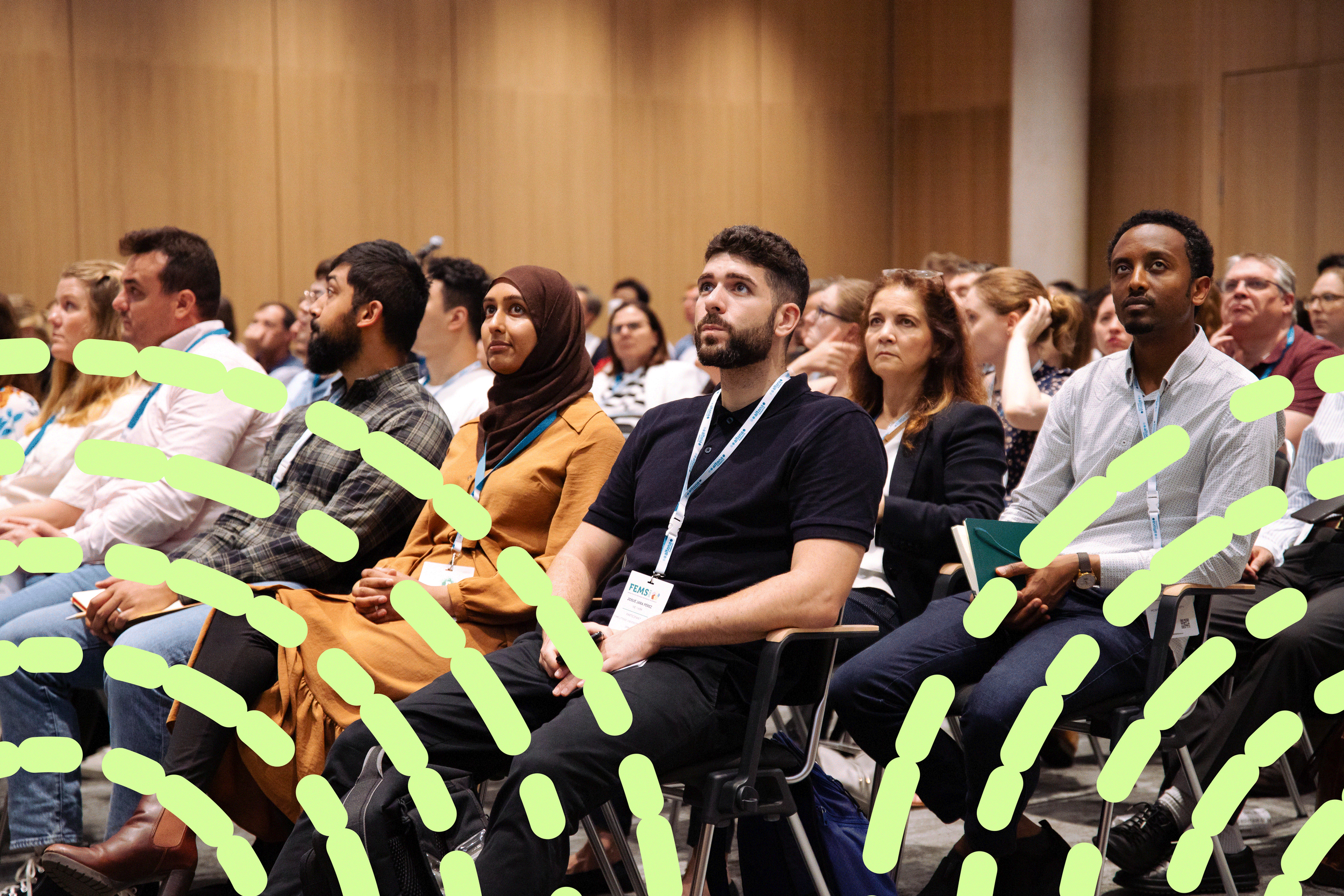Registration is now open
|
Registration is now open |
Interactive Sessions
Get ready to dive into microbiology’s most pressing topics through dynamic, participatory sessions. Designed to foster active engagement across disciplines, these 60-90 minute sessions go beyond traditional talks—expect panels, interviews, idea pitches, and workshops that encourage discussion and hands-on learning.
Below, you will find the latest selection of accepted sessions, offering top-tier knowledge sharing on cutting-edge topics. The final speaker lineup and session details are still being confirmed, so check back soon for updates.
Browse the sessions by topic track:
-
Explore the intricate relationships between microbes and their environments, uncovering insights into climate change, urbanisation, ecosystems, and pollution.
Microbial dynamics in a changing world
This session will explore the key effects of climate change on microbial ecosystems and the feedback they provide. We will explore different biomes across the world, examining studies on microbial responses, metabolic adaptations of microbial communities and their impact on biogeochemical cycles, and the effects on symbioses and interactions within complex microbial assemblages.Speakers: Max Häggblom, Rutgers University (USA) + more speakers tbc
From the European Academy of Microbiology (EAM) | Ecological insights from recent viral outbreaks
Join this session to gain a deeper understanding of the ecological and genetic factors that drive the spread of viral outbreaks, including avian influenza, SARS, Nipah, and West Nile viruses.Speakers: Harald Brüssow, KU Leuven (Belgium), + Jordi Figuerola, Estación Biológica de Doñana-CSIC (Spain)
Unveiling the Secrets of Microbial Communities: The Influence of Biotic and Abiotic Factors on Biofilm Formation in Food Systems
Experts will discuss how environmental stressors, and microbial communities contribute to biofilm formation and resilience, making sanitation efforts more challenging.Speakers: Valentina Trinetta, Kansas State University (USA), Jasna Kovac, The Pennsylvania State University (USA), Pierluigi Di Ciccio, University of Turin (Italy), Claudia Guldimann, Ludwig-Maximilians-University Munich (Germany), and Martin Wagner, University of Veterinary Medicine (Austria)
Microbial dark matter: Knowing the unknown
Delve into the hidden world of uncharacterized microbial species and the challenges of deciphering gene functions, even in well-studied organisms. With insights from cutting-edge tools like metagenomics and advanced bioinformatics, attendees will uncover how these unknowns influence ecosystems, health, and biotechnology.Speakers: Kimberly Kline, University of Geneva (Switzerland) + Julia Willett, University of Minnesota (USA)
Thriving in extremes: Molecular insights from nature’s toughest organisms
Explore the molecular adaptations of extremophiles thriving in Earth’s harshest environments—from deep-sea hydrothermal vents to frozen polar landscapes. Discover the valuable insights that these survival strategies bring to fields such as biotechnology, medicine, and astrobiology.Speakers: Claudia Coleine, University of Tuscia (Italy), Claudio Donati, University of Tuscia (Italy), and Federico Biagioli, University of Tuscia (Italy)
Something (very) old, something new: Microbial solutions for sustainability
Join us for an engaging session exploring microbial-based approaches and cutting-edge biotechnological applications and contribute to shaping environmental solutions for a sustainable future. Panelists will delve into paleo-archives and ancient DNA to rediscover lost biodiversity, demonstrate how microbial capabilities can drive eco-friendly technologies, and present groundbreaking synthetic biology applications.Speakers: Cecilia Flocco, Leibniz Institute DSMZ (Germany) + more speakers tbc
-
Understand how microbes and microbiomes shape human health, from advances in diagnostics and therapeutics to the fight against antimicrobial resistance and infectious diseases.
Functional gut microbiomics of the gut-brain axis
Explore microbiome opportunities and challenges from an industrial perspective, with a focus on disease prevention and brain health treatments. Experts will discuss new approaches to microbiome analysis—including bacterial spores and phages, as well as how diet influences brain function, and cutting-edge technology platforms like the Gut-on-a-Chip physiomimetic Gumi system.Speakers: Stanley Brul, (Netherlands), Jianbo Zhang, University of Amsterdam (Netherlands), Sahar El Aidy, University of Amsterdam (Netherlands), Ghislain Schyns, DSM-Firmenich (Switzerland)
OneHealth and bioinformatics: Bridging human, animal, and environmental health
Microbial communities across human, animal, and environmental interfaces play a crucial role in health and disease, yet much remains unexplored due to unresolved microbial dark matter. The OneHealth approach highlights the interconnectedness of these domains, requiring robust bioinformatics to uncover microbial diversity and track AMR trends.Speakers: Guerrino Macori, University College Dublin (Ireland) + more speakers tbc
From the European Academy of Microbiology (EAM) | Revolutionizing infection microbiology: Unlocking insights through human challenge studies
Human challenge studies have led to breakthroughs in vaccine development over the past two decades. This session will highlight key successes and discuss how human infection models can provide critical insights into bacterial pathogenesis and host-pathogen interactions in clinically relevant settings.Speakers: Jay Hinton, University of Liverpool (UK), and Malick Gibani, Imperial College (UK) + more speakers tbc
From the European Academy of Microbiology (EAM) | Why is pertussis resurging in fully vaccinated European populations and how can we contain it?
Despite high vaccination rates, pertussis (whooping cough) is making a comeback in Europe. Leading European experts will analyze the causes of this resurgence, discussing the epidemiological situation and pertussis vaccine failure mechanisms, and proposing new strategies to contain the spread of the disease.Speakers: Peter Sebo, Institute of Microbiology ASCR. (Czechia), Kingston Mills, Trinity College Dublin (Ireland), Andrew Gorringe, UK Health Security Agency (UK)
Omics to improve diagnosis and management of multidrug-resistant pathogens
A complete understanding of pathogen physiology and virulence is essential for developing new treatment strategies. This session will explore how multi-omics strategies are providing useful insights into the diseases.Speakers: Daniela Maria Cirillo, University of Oxford (UK) + more speakers tbc
-
Discover how microbial technologies—from synthetic biology to sustainable solutions—are reshaping industries and addressing global challenges.
From the European Academy of Microbiology (EAM) | Bacterial computation unleashed: Programming microorganisms for new-to-nature actions
Computation encompasses the ability to process signals as inputs and convert them into specific outputs based on coded instructions. This session analyses how microorganisms execute such functions, as well as synthetic biology-based approaches for genetically programming bacteria.Speakers: Victor de Lorenzo, National Center of Biotechnology (Spain), Angel Goni-Moreno, National Center of Biotechnology (Italy), Yolanda Schaerli, University of Lausanne (Switzerland), Manish Kushwaha, Micalis Institute (France), and Sangram Bagh, Saha Institute of Nuclear Physics (India)
Safeguarding biosecurity in synthetic nucleic acid synthesis
In this session, attendees will discuss the latest screening guidelines from around the world, assess their relevance and use cases in a European context, and propose key parameters for advancing EU-led initiatives to uphold global biosecurity and strengthen the EU’s resilience.Speakers: Sana Zakaria, RAND Europe (UK), Sophie Peresson, IBBIS (France) + more andspeakers tbc
Geobiotechnology: Harnessing the power of microbiology for responsible metal recovery
Discover how microbiology is transforming the recovery of technology metals from low-grade ores and (e-)waste streams through innovative geobiotechnology applications. This session explores the latest research and scalable solutions for metal recovery, addressing key challenges, limitations, and future perspectives. It is ideal for scientists, professionals in biohydrometallurgy, environmental biotech, and regulatory sectors interested in sustainable metal recovery.Speakers: Lot Van der Graaf + Martyna Glodowska, Radboud University (Netherlands)
Upcycling with extremophiles: Biotechnological advances for a sustainable future
This session delves into the world of extremophilic microorganisms and their potential to address global challenges. By studying microbes adapted to extreme environments, we gain insights into climate resilience, ecosystem balance, and bioprospecting for high-value chemical production, sustainable bio-based industries, and circular bioeconomies.Speakers: Irene Sanchez Andrea + more speakers tbc
The future of fermented food: Building an alliance for novel sustainable food systems
With a growing global population, climate change, and ecological challenges, innovative sustainable food systems are essential to achieving UN SDG2 (zero hunger). This session explores how research centres, industry, government, environmental groups, and the public can collaborate through a quintuple helix of innovation to tackle these urgent issues.Speakers: John Morrissey, University College Cork (UK), Paula Branduardi, Univeristy of Milan-Bicocca (Italy) + more speakers tbc
Microbial spy: Solving real-world cases with microbial forensics
Step into the role of a microbiologist working on a real-world forensic investigation in this interactive session. Through case studies, attendees will explore how microbiology helps solve crimes, identify infection sources, and trace outbreaks using microbial forensics, laboratory techniques, bioinformatics, and data analysis tools.Speakers: Olesia Havryliuk, D. K. Zabolotny Institute of Microbiology and Virology (Ukraine), Mariia Loboda, D. K. Zabolotny Institute of Microbiology and Virology (Ukraine), and Nury Infante, Universitat Politècnica de Catalunya (Spain)
Non-conventional yeasts in basic science and biotechnology
This session will explore non-conventional yeasts, which are gaining increasing attention for their unique characteristics, such as thriving at high temperatures, growing on one-carbon compounds like methanol, metabolizing pentoses (xylose, L-arabinose), and overproducing important substances like riboflavin and astaxanthin. These yeasts also serve as key models for studying peroxisome homeostasis and are efficient cell factories for producing heterologous proteins with industrial and medical applications.Speakers: Andriy Sibirny, Institute of Cell Biology NAS of Ukraine (Ukraine), Duccio Cavalieri, University of Florence (Italy), Justyna Ruchala, and Isabel Sá-Correia, University of Lisbon (Portugal), Volkmar Passoth, Swedish University of Agricultural Sciences (Sweden)
Microbes in a Plastic World: Challenges and Opportunities
Discover how microbes might influence a sustainable, plastic-conscious future with us as we explore cutting-edge research and considerations. Anyone interested in microbiology, sustainability, and the battle against plastic pollution should attend this event.Speakers: Priscilla Carrillo-Barragan, University of Basel (Switzerland), and Lynsay Blake, Department for Environment, Food, Rural Affairs (UK) + more speakers tbc
-
Build essential career skills for your professional development as a microbiologist, covering everything from career pathways and funding opportunities to science communication and entrepreneurship.
Early career researcher session: Getting the most from the Congress, while building key skills and expanding career options
Back by popular demand, this interactive session is designed for early career attendees, including first-time attendees. Drawing on our extensive experience running research groups with over 50 successful PhD students, we will share tips on networking, overcoming challenges, building professional contacts, and making the most of every opportunity at the Congress & Exhibition.Speakers: Hilary Lappin-Scott, Cardiff University (UK) + more speakers tbc
What funding can I apply for?
Engage with representatives from major EU research funding bodies in this interactive panel discussion for early- and mid-career researchers. Ask experts about funding opportunities and gain insights into applying for grants.Speakers: Jana Jass, Örebro University (Sweden) + Alessandra Ferrari, European Research Council (Belgium)
Creating a culture of inclusion (Part 1 and 2)
Join us to explore themes of belonging and inclusion in microbiology. Our diverse panel will share personal experiences, and we encourage you to contribute your own insights as we discuss how to identify and overcome barriers to belonging and inclusion. This session is part of a series on Diversity, Equity, and Inclusion (DEI) to promote inclusive practices in microbiology.Speakers: Clare Taylor, Edinburgh Napier University (UK) + Beatrix Fahnert, University of Lincoln (UK)
A deep dive into science communication: Creating an engaging story from your research
Learn how to craft your research into an engaging narrative. By the end of this session, you will have a compelling science story to share at the Congress & Exhibition, on social media, or even in grant applications and job interviews.Speakers: Sarah Wettstadt, MicroComms (Spain) and Joseph Shuttleworth, FEMS (Netherlands)
Fungal galaxies: A mysterious, visual journey into the most intimate phenotypes of invisible fungal biodiversity
This session blends science and art to explore complex topics like fungal identification and true sustainable lab methods, offering a fresh perspective on fungi’s role in agriculture.Speakers: Diego Dylan Bianchio, Trinity College (Ireland) + more speakers tbc
Revolutionizing microbiology education: Harnessing service-learning to engage societal needs
Join this interactive session on designing and presenting Service-Learning (S-L) projects—an innovative approach to teaching and learning by engaging with societal needs. Open to all attendees, this session explores how microbiologists at any stage can share knowledge with students or young researchers through real community engagement.Speakers: María-José Valderrama, University Complutense of Madrid (Spain) + more speakers tbc
How to reconnect microbiology and society through participatory environmental microbiome studies: The Bicocca Sampling Days model
Discover the Bicocca Sampling Days (BSDs) model—an innovative approach to reconnect microbiology with society through participatory microbiome sampling. By involving the public in hands-on environmental sampling, BSDs help dispel misconceptions about microbes and foster a deeper understanding, especially in a post-pandemic world.Speakers: Giulia Ghisleni, University of Milano-Bicocca (Italy) + more speakers tbc






